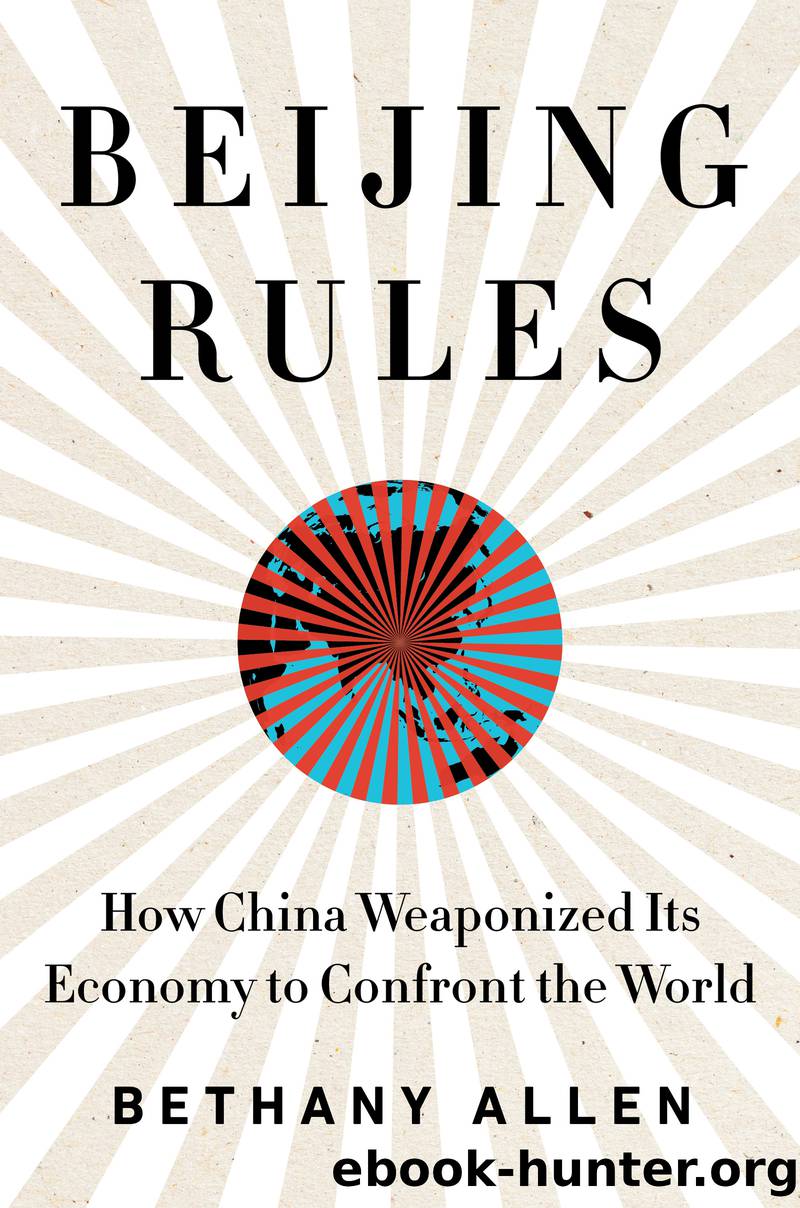Beijing Rules by Bethany Allen

Author:Bethany Allen
Language: eng
Format: epub
Publisher: HarperCollins
Published: 2023-05-25T00:00:00+00:00
9
Hong Kong Outlaws Global Activism
The global crisis created by the Covid-19 pandemic gave Beijing the perfect opportunity to silence the tradition of free speech and protest that had long thwarted its plans for Hong Kong. Western countries were far too preoccupied to take serious countermeasures, and Chinaâs leaders knew it. Beijingâs takeover of Hong Kong demonstrated the new confidence and ambition with which Xi now viewed the partyâs rule. That domination was now highly public, not hidden in the shadows of influence or corruption. In June 2020, Beijing asserted authoritarian rule over one of the worldâs most important financial hubs, with a clearly outlined plan to use control over financial assets to crush dissent. And its rule extended far beyond the city itself, with a powerful new law creating a foundation for waging lawfare on free civil societies around the worldâincluding in the United States.
* * *
On the morning of July 31, 2020, Samuel Chu woke up when his cell phone rang. It was a friend of his, a journalist who worked for the BBC in Washington, DC.
âHow are you doing?â the friend said, sounding concerned.
Chu was confused. It was 5 a.m. in Los Angeles, where he was based. The night before had been just like any normal night. Heâd gone to bed after watching some episodes of Law & Order. âIâm sleeping!â he said.
âYou better check the news,â his friend said.
When Chu did, he was stunned. The Hong Kong government had just issued an arrest warrant for him and five other Hong Kong pro-democracy activists under the newly passed National Security Law, accusing them of âincitement to secessionâ and âcollusion with foreign forces.â It was the first time that the new law had been invoked to target people living outside Hong Kong.
But Chu had been an American citizen for almost twenty-five years and had spent much of the past twenty years as a community organizer in the United States; the Hong Kong advocacy work he had done was through a U.S.-registered, U.S.-based nonprofit that worked with U.S. lawmakers on Capitol Hill. The Beijing-backed government of Hong Kong was accusing an American of âcolludingâ with his own government by engaging in advocacy that is a right under U.S. law. It was a shot across the bow warning Beijingâs critics that no matter where in the world they lived, the party was coming for them. It was also a direct attack on American civil society and political freedom, a clear message that Beijing believed its jurisdiction extended onto U.S. soil.
Two months earlier, in May 2020, as much of the world was buried deep in the first wave of Covid-19 lockdowns, Beijing had decided to take Hong Kong. It wasnât a military invasion: no tanks rolled down the streets of Chinaâs only free city. Instead, Beijing used the power of law to impose its will on Hong Kongâs civil society, courts, police, universities, and streets, dismantling the cityâs celebrated political institutions and freedoms in a matter of months.
That month, the National Peopleâs Congress, Chinaâs rubber-stamp legislature, convened in Beijing for its annual two-week meeting.
Download
This site does not store any files on its server. We only index and link to content provided by other sites. Please contact the content providers to delete copyright contents if any and email us, we'll remove relevant links or contents immediately.
The Art of Coaching Workbook by Elena Aguilar(51198)
Trainspotting by Irvine Welsh(21663)
The Secret History by Donna Tartt(19085)
Twilight of the Idols With the Antichrist and Ecce Homo by Friedrich Nietzsche(18632)
All the Missing Girls by Megan Miranda(16023)
Cat's cradle by Kurt Vonnegut(15351)
Ready Player One by Cline Ernest(14675)
Talking to Strangers by Malcolm Gladwell(13370)
Fangirl by Rainbow Rowell(9249)
The remains of the day by Kazuo Ishiguro(8998)
The Compound Effect by Darren Hardy(8965)
Thirteen Reasons Why by Jay Asher(8907)
Tools of Titans by Timothy Ferriss(8393)
Periodization Training for Sports by Tudor Bompa(8271)
Wonder by R. J. Palacio(8108)
The Lover by Duras Marguerite(7901)
A Court of Wings and Ruin by Sarah J. Maas(7843)
Change Your Questions, Change Your Life by Marilee Adams(7780)
The Complete Stick Figure Physics Tutorials by Allen Sarah(7372)
